The million dollar question is, "Who in the World is Yu Darvish?" This phenom has burst on the scene in Japan and is a marvel to behold on the mound. He lacks the polish and seasoning that a true star pitcher possesses, but it's important to keep in mind that we are talking about a 19 year old player that was rushed to the pros by a team looking to stake its identity among a field of more famous teams.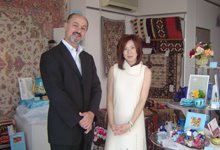 The story begins with a Japanese woman and an Iranian man, who married and settled down in Osaka, Japan to raise a family. The elder Darvish was a player for the Iranian national soccer team, and met his wife in the United States while the two attended university. His athletic roots were apparently passed on to his son, as the young Darvish began to show his uncanny baseball skills as a second grader. Progressing quickly, Yu Darvish joined a boys baseball league in junior high school and became the ace of the rotation in no time. As a 16 year old high school student in Sendai, Miyagi Prefecture, this stellar young pitcher struck out 11 consecutive batters and 13 overall to lead his team to the finals of the prefectural championships. He also threw a 4-hit, 80 pitch, complete game shutout in one hour and nineteen minutes that season topping out at 87 MPH against neighboring Iwate Prefecture's top club. That was just the beginning of the story.
The story begins with a Japanese woman and an Iranian man, who married and settled down in Osaka, Japan to raise a family. The elder Darvish was a player for the Iranian national soccer team, and met his wife in the United States while the two attended university. His athletic roots were apparently passed on to his son, as the young Darvish began to show his uncanny baseball skills as a second grader. Progressing quickly, Yu Darvish joined a boys baseball league in junior high school and became the ace of the rotation in no time. As a 16 year old high school student in Sendai, Miyagi Prefecture, this stellar young pitcher struck out 11 consecutive batters and 13 overall to lead his team to the finals of the prefectural championships. He also threw a 4-hit, 80 pitch, complete game shutout in one hour and nineteen minutes that season topping out at 87 MPH against neighboring Iwate Prefecture's top club. That was just the beginning of the story.
Major League scouts began watching Darvish while he played in the boys league in junior high school. It seems that scouts will find pitchers wherever they may be, and however young they are. More and more of these scouts were seen in the stands as Darvish spearheaded Tohoku High School's run for the Koshien National High School Baseball Invitational(Spring) and Championship(Summer) in 2004. Representatives of the Dodgers, Mets, and Angels were salivating at the opportunity to sign the young man to a minor league deal before the Koshien trophy was even in the hands of the eventual winner. Standing at 6'4", with a 93+ MPH fastball now in his arsenal, along with an excellent curve, changeup, and knuckle curve, what wasn't to like?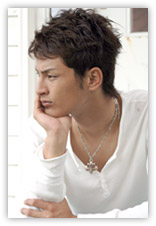 Darvish also enjoyed a cult following of sorts as the national media and a throng of idol-worshipping female fans fawned over the ace pitcher for his "exotic" good looks. It wasn't so long ago when "mixed-blood" people were shunned by Japanese society, and the perception of impurity offended the homogenous Japanese sensibilities to the point that anyone not completely Japanese was forbidden to participate in some of the Japanese national athletic events. Sadaharu Oh was one such individual. Check out his autobiograpy, co-authored by David Falkner, pages 54-57. Times they are a-changin'.
Darvish also enjoyed a cult following of sorts as the national media and a throng of idol-worshipping female fans fawned over the ace pitcher for his "exotic" good looks. It wasn't so long ago when "mixed-blood" people were shunned by Japanese society, and the perception of impurity offended the homogenous Japanese sensibilities to the point that anyone not completely Japanese was forbidden to participate in some of the Japanese national athletic events. Sadaharu Oh was one such individual. Check out his autobiograpy, co-authored by David Falkner, pages 54-57. Times they are a-changin'.
In the Spring warm up to the main event in 2004, high school teams from around Japan gathered in Osaka to play one another for the 76th Koshien Spring Tournament. Darvish electrified the fans, media, and scouts by pitching a 2-0 no-hitter against Kumamoto Kogyo on March 26th. He allowed only 2 walks and a baserunner who reached on an error, while going all 9 for the victory. The team would be ousted from the competition as Yu struggled with back and shoulder pain after his brilliant performance and was unable to pitch. The Summer would have to be his redemption.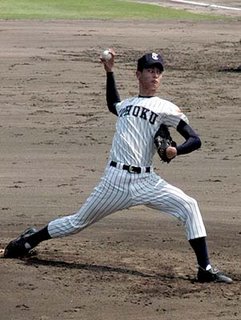 On August 7th, 2004 the real competition began. The coveted 86th Summer Championship was on the line, and Darvish figured to lead his team deep into the event's final days. All eyes were on the now famous young ace. In his first outing, Darvish tossed an 8-hit, 13-0 shutout against Kita Ozu High School striking out 10 and hitting 91 on the radar gun. In his second start against Ishikawa Yugakukan, the young hurler delivered another complete game shutout, fanning 12, against a team that hit over .400 in the qualifying rounds. The nation was captivated by the youthful star, and his legend began to swell. Could he be good enough to carry his team to the title? It would be on his shoulders yet again as Tohoku faced Chiba Keidai Fuzoku in the 3rd round of the tournament.
On August 7th, 2004 the real competition began. The coveted 86th Summer Championship was on the line, and Darvish figured to lead his team deep into the event's final days. All eyes were on the now famous young ace. In his first outing, Darvish tossed an 8-hit, 13-0 shutout against Kita Ozu High School striking out 10 and hitting 91 on the radar gun. In his second start against Ishikawa Yugakukan, the young hurler delivered another complete game shutout, fanning 12, against a team that hit over .400 in the qualifying rounds. The nation was captivated by the youthful star, and his legend began to swell. Could he be good enough to carry his team to the title? It would be on his shoulders yet again as Tohoku faced Chiba Keidai Fuzoku in the 3rd round of the tournament.
In what can only be described as a colossal disappointment, Darvish dominated the Chiba ballclub for 8.2 innings, throwing yet another shutout, before an infield error cost the team the tying run and sent the game into extra innings. One out away from his third shutout victory and a date with destiny, and it all came crashing down. Tohoku went on to lose the ballgame 3-1 in the 10th inning, and Darvish's storybook high school career was over.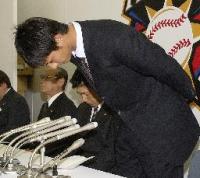 The Japanese Professional League Draft promised to be a huge event in 2004, as Yu seemed perched to be the figurehead of the day. One lucky team would secure a diamond in the rough pitcher with "can't miss" potential written all over his right arm. That team would be the Nippon Ham Fighters of the Pacific League, who had recently uprooted their franchise and moved to the northern island of Hokkaido. Sapporo, Japan would be the new domed hometown of the team, and Yu Darvish. With a freshly inked $145,000 contract to his name, how soon before the 18 year old would make his debut with the Big Boys? (I know that salary is a joke by American standards, but 18 year old pitchers are at the mercy of the good old boy ownership system in Japan.)
The Japanese Professional League Draft promised to be a huge event in 2004, as Yu seemed perched to be the figurehead of the day. One lucky team would secure a diamond in the rough pitcher with "can't miss" potential written all over his right arm. That team would be the Nippon Ham Fighters of the Pacific League, who had recently uprooted their franchise and moved to the northern island of Hokkaido. Sapporo, Japan would be the new domed hometown of the team, and Yu Darvish. With a freshly inked $145,000 contract to his name, how soon before the 18 year old would make his debut with the Big Boys? (I know that salary is a joke by American standards, but 18 year old pitchers are at the mercy of the good old boy ownership system in Japan.)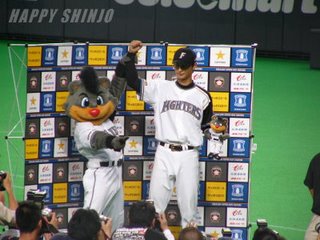 Darvish opened the 2005 campaign with the Fighters' minor league club and looked to make a quick name for himself. Coming off a stellar Koshien, and a highly publicized draft, it was no surprise that the club was looking for a savior to arrive in Sapporo lightning fast. A minor controversy erupted in the national media and pictured were published of Yu smoking at a pachinko (think slot machine) parlor. The team confined him to the minor league dormitory and restricted his movements. Smoking is illegal for individuals under 20 years old in Japan, hence the uproar. (Again, this seems preposterous by American standards, but Japan is a country of strict cultural duties).
Darvish opened the 2005 campaign with the Fighters' minor league club and looked to make a quick name for himself. Coming off a stellar Koshien, and a highly publicized draft, it was no surprise that the club was looking for a savior to arrive in Sapporo lightning fast. A minor controversy erupted in the national media and pictured were published of Yu smoking at a pachinko (think slot machine) parlor. The team confined him to the minor league dormitory and restricted his movements. Smoking is illegal for individuals under 20 years old in Japan, hence the uproar. (Again, this seems preposterous by American standards, but Japan is a country of strict cultural duties).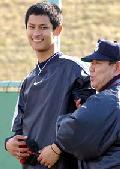 In his first 5 starts with the minor league affiliate, Darvish posted a 1-1 record with 26 innings pitched, 25 hits, 12 walks, 26 strikeouts, and 16 runs allowed (12 earned). That works out to a 1.35 WHIP and a 4.15 ERA. Still, despite the mediocre numbers and the wet-behind-the-ears status of young Darvish, the strikeouts(9Ks per 9 IP) and marquee quality of the pitcher won out and he was vaulted into the Bigs. After being called up to Sapporo, the future ace showed his potential, along with a bit of nerves, as he went 5-5 in 14 starts with a 3.53 ERA over 94.1 innings pitched. In those innings, Darvish gave up 97 hits, 48 walks, and 52 strikeouts. The high walk total accounted for a less than impressive 1.54 WHIP and a whole lot of question marks about how fast he'd been pushed along.
In his first 5 starts with the minor league affiliate, Darvish posted a 1-1 record with 26 innings pitched, 25 hits, 12 walks, 26 strikeouts, and 16 runs allowed (12 earned). That works out to a 1.35 WHIP and a 4.15 ERA. Still, despite the mediocre numbers and the wet-behind-the-ears status of young Darvish, the strikeouts(9Ks per 9 IP) and marquee quality of the pitcher won out and he was vaulted into the Bigs. After being called up to Sapporo, the future ace showed his potential, along with a bit of nerves, as he went 5-5 in 14 starts with a 3.53 ERA over 94.1 innings pitched. In those innings, Darvish gave up 97 hits, 48 walks, and 52 strikeouts. The high walk total accounted for a less than impressive 1.54 WHIP and a whole lot of question marks about how fast he'd been pushed along.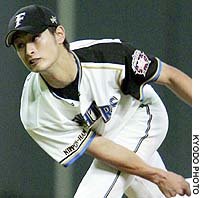 Enter the 2006 season, and a fresh start with the Fighters from Day One. At 19, Darvish had gone from high school phenom, to minor league tabloid story, to struggling rookie hurler in a blink of an eye. You would never see this kind of thing in a million years in the US, but nevertheless here we are. How has Darvish fared to this point in his sophmore campaign? In a similar snapshot to his rookie totals, Yu has started 15 ballgames for the Fighters so far. He is 6-5 with a 3.08 ERA in 96.1 innings pitched. He's given up 88 hits and 34 walks while striking out 71 and holding opponents to a .244 OBA. His WHIP stands at 1.28 and he's on a roll in his last 3 games. In those contests he is 2-0 with a 0.43 ERA, 0.90 WHIP and 14 strikeouts in 21 IP.
Enter the 2006 season, and a fresh start with the Fighters from Day One. At 19, Darvish had gone from high school phenom, to minor league tabloid story, to struggling rookie hurler in a blink of an eye. You would never see this kind of thing in a million years in the US, but nevertheless here we are. How has Darvish fared to this point in his sophmore campaign? In a similar snapshot to his rookie totals, Yu has started 15 ballgames for the Fighters so far. He is 6-5 with a 3.08 ERA in 96.1 innings pitched. He's given up 88 hits and 34 walks while striking out 71 and holding opponents to a .244 OBA. His WHIP stands at 1.28 and he's on a roll in his last 3 games. In those contests he is 2-0 with a 0.43 ERA, 0.90 WHIP and 14 strikeouts in 21 IP.
He's tossed a few stinkers this season, but it looks like he's learning. In fact, if you throw away a poor outing against Yakult on June 13th, Darvish has dominated 5 of the last 6 games he's started. In the 5 games he's pitched well, he is 4-0 with a 0.69 ERA, 0.66 WHIP, 33 strikeouts in 29 innings, and the walks are under control with only 10. He doesn't turn 20 until August 16th, but already we are seeing early signs of greatness from the young pro. I'm sure his struggles will resurface at some point, but the talent is there and I find the young man's future intriguing. I hope you do too, and I'd like to invite you to check back often for updates on the career of Yu Darvish. Until next time......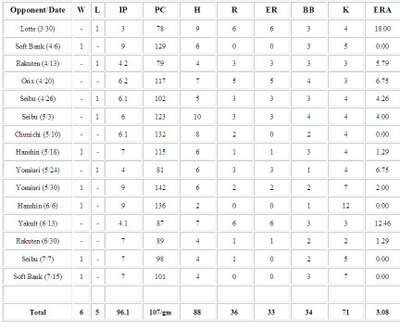
Tuesday, July 25, 2006
Who is Yu Darvish?
Wednesday, July 12, 2006
The Watch Begins
 Welcome to another spin-off project of Canyon of Heroes. In case you don't know COH, it's a Yankees Fan Blog dedicated to the daily drama of the New York Yankees. Canyon of Heroes has also endeavored to cover wide-ranging baseball events and points of interest from New York to Los Angeles, and Cuba to Japan. The first such spin-off is Matsuzaka Watch, a blog designed to follow the career of Daisuke Matsuzaka of the Seibu Lions. As a resident of Japan, I spend part of my energy following Japanese Pro Yakyu in an effort to educate fans around the world about the Japanese game, and provide a layman's scouting report on various Far East players for Yankee fans back home.
Welcome to another spin-off project of Canyon of Heroes. In case you don't know COH, it's a Yankees Fan Blog dedicated to the daily drama of the New York Yankees. Canyon of Heroes has also endeavored to cover wide-ranging baseball events and points of interest from New York to Los Angeles, and Cuba to Japan. The first such spin-off is Matsuzaka Watch, a blog designed to follow the career of Daisuke Matsuzaka of the Seibu Lions. As a resident of Japan, I spend part of my energy following Japanese Pro Yakyu in an effort to educate fans around the world about the Japanese game, and provide a layman's scouting report on various Far East players for Yankee fans back home.
Matsuzaka Watch is a project with an immediate goal. Bring Daisuke Matsuzaka to the Yankees. By generating interest and awareness about the young star player, I hope to build excitement and demand for his services in the Big Apple. Darvish Watch, on the other hand, is more of a long term project with a slightly different goal in mind. Yes, I hope to inform and generate interest about this stellar young player as well, but he is far from ready for the Major Leagues, and can be described as a diamond in the rough. Why Darvish, and why now?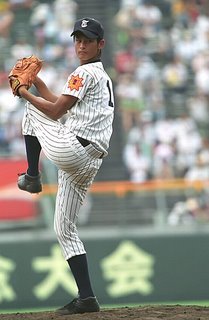 I've been a fan of Yu Darvish since I first saw him pitch at the Koshien Summer High School Baseball Invitational 2 years ago. In 2004, Darvish led the Tohoku High School club to a second place finish at Koshien and turned heads with his brilliant pitching. As a resident of the Tohoku district of Japan, I took immediate notice of the young man's game. The city of Sendai is kind of an unofficial capital city of Tohoku, much the same as Boston is the center of New England in the US. I live some 2 and a half hours from Sendai, but the buzz about the tall half-Iranian, half-Japanese pitcher shook Northern Japan with a tremendous excitement. I was hooked.
I've been a fan of Yu Darvish since I first saw him pitch at the Koshien Summer High School Baseball Invitational 2 years ago. In 2004, Darvish led the Tohoku High School club to a second place finish at Koshien and turned heads with his brilliant pitching. As a resident of the Tohoku district of Japan, I took immediate notice of the young man's game. The city of Sendai is kind of an unofficial capital city of Tohoku, much the same as Boston is the center of New England in the US. I live some 2 and a half hours from Sendai, but the buzz about the tall half-Iranian, half-Japanese pitcher shook Northern Japan with a tremendous excitement. I was hooked.
I also have an acute interest in Darvish for his multi-cultural heritage. I am an American of German-Irish background, and my wife is Japanese. At the moment we are expecting our first child, and I feel a great enthusiasm for the rich and diverse experience our baby is about to have as a part of two distinct cultures. Role models for children of multi-cultural families are increasingly visible, and in no part of society moreso than sports. I think of Derek Jeter's impact immediately. Darvish shares some element of my personal experience, and combined with his intriguing ability, he is a natural fit for this blog.
What follows is a chronicle of the soon-to-be 20 year old's early career, beginning with a biography which will lead to the present day. Stay tuned for a comprehensive look at Yu Darvish of the Nippon Ham Fighters, and come back often for the latest on his promising young career.

